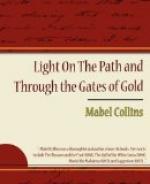are not roused or excited by the partial and erroneous
fragments of information which are brought to their
ears by the changing voices of those around them.
When I speak of knowledge, I mean intuitive knowledge.
This certain information can never be obtained by
hard work, or by experiment; for these methods are
only applicable to matter, and matter is in itself
a perfectly uncertain substance, continually affected
by change. The most absolute and universal laws
of natural and physical life, as understood by the
scientist, will pass away when the life of this universe
has passed away, and only its soul is left in the
silence. What then will be the value of the knowledge
of its laws acquired by industry and observation?
I pray that no reader or critic will imagine that
by what I have said I intend to depreciate or disparage
acquired knowledge, or the work of scientists.
On the contrary, I hold that scientific men are the
pioneers of modern thought. The days of literature
and of art, when poets and sculptors saw the divine
light, and put it into their own great language—these
days lie buried in the long past with the ante-Phidian
sculptors and the pre-Homeric poets. The mysteries
no longer rule the world of thought and beauty; human
life is the governing power, not that which lies beyond
it. But the scientific workers are progressing,
not so much by their own will as by sheer force of
circumstances, towards the far line which divides
things interpretable from things uninterpretable.
Every fresh discovery drives them a step onward.
Therefore do I very highly esteem the knowledge obtained
by work and experiment.
But intuitive knowledge is an entirely different
thing. It is not acquired in any way, but is,
so to speak, a faculty of the soul; not the animal
soul, that which becomes a ghost after death, when
lust or liking or the memory of ill deeds holds it
to the neighborhood of human beings, but the divine
soul which animates all the external forms of the
individualized being.
This is, of course, a faculty which indwells in that
soul, which is inherent. The would-be disciple
has to arouse himself to the consciousness of it by
a fierce and resolute and indomitable effort of will.
I use the word indomitable for a special reason.
Only he who is untameable, who cannot be dominated,
who knows he has to play the lord over men, over
facts, over all things save his own divinity can arouse
this faculty. “With faith all things, are
possible.” The skeptical laugh at faith
and pride themselves on its absence from their own
minds. The truth is that faith is a great engine,
an enormous power, which in fact can accomplish all
things. For it is the convenant or engagement
between man’s divine part and his lesser self.
The use of this engine is quite necessary in order
to obtain intuitive knowledge; for unless a man believes
such knowledge exists within himself how can he claim
and use it?




